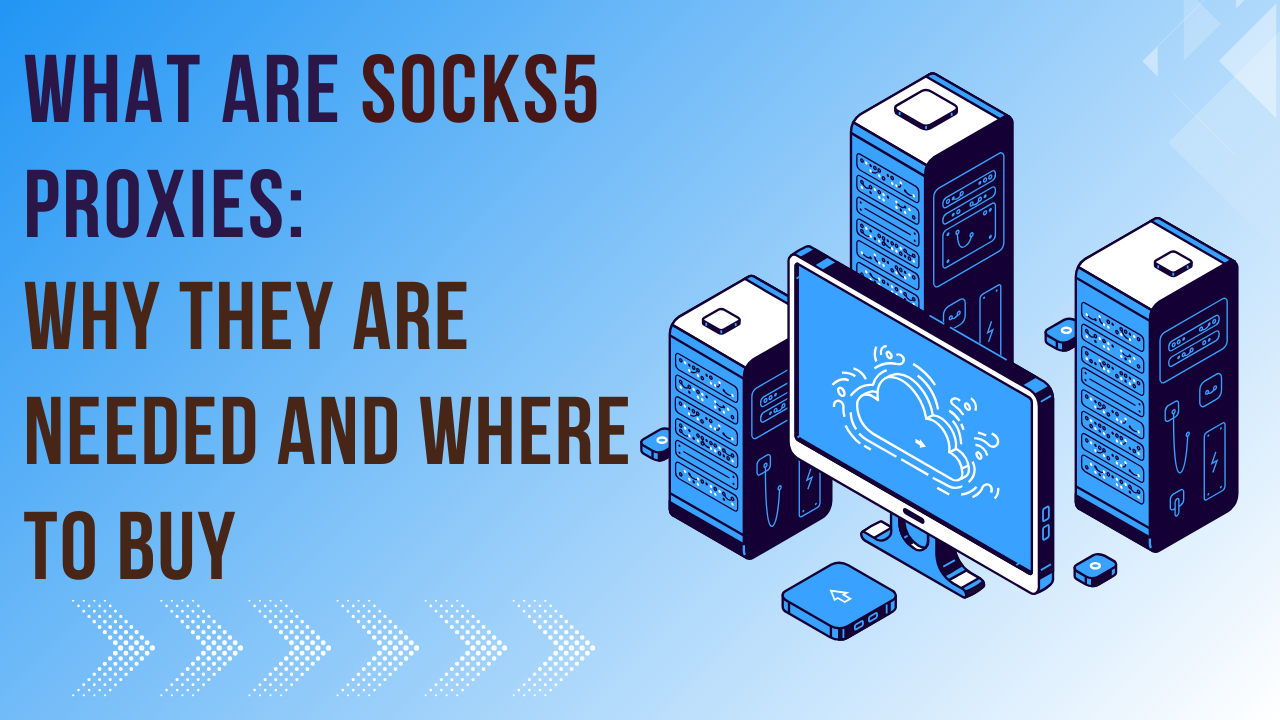What Are SOCKS5 Proxies: Why They Are Needed and Where to Buy
In today's digital age, privacy, security, and efficient data management are essential. SOCKS5 proxies play a crucial role in enhancing these aspects by providing a versatile and robust solution for internet traffic management. This article explores what SOCKS5 proxies are, why they are necessary, and where you can purchase them.
What is a SOCKS5 Proxy?
A SOCKS5 proxy is an advanced type of proxy server that routes network traffic between a client and a server through the SOCKS (Socket Secure) protocol. Unlike HTTP proxies, which are limited to handling web traffic, SOCKS5 operates at a lower level of the OSI model, enabling it to manage various types of internet traffic including HTTP, HTTPS, FTP, and SMTP.
One of the key features of SOCKS5 is its support for both TCP (Transmission Control Protocol) and UDP (User Datagram Protocol). This versatility allows SOCKS5 to handle a wide range of applications, from web browsing and online gaming to streaming and VoIP (Voice over Internet Protocol). Additionally, SOCKS5 includes advanced authentication methods, such as username/password and GSS-API (Generic Security Services Application Program Interface), ensuring secure and authorized access to the proxy server.
Another important feature of SOCKS5 is its support for IPv6 addresses, which is increasingly critical as the internet transitions from IPv4 to IPv6. This capability ensures that SOCKS5 proxies remain relevant and functional in modern network environments. Furthermore, SOCKS5 can perform domain name resolution on behalf of the client, reducing latency and improving connection efficiency.
Why Are SOCKS5 Proxies Needed and How Are They Used?
SOCKS5 proxies are essential for various reasons, providing numerous benefits for both personal and professional use. Here are some key reasons why they are needed and examples of their applications:
* Enhanced Security: SOCKS5 proxies offer an additional layer of security by encrypting data transmissions and supporting advanced authentication methods, protecting sensitive information from cyber threats.
* Anonymity and Privacy: By masking the user's IP address, SOCKS5 proxies ensure that online activities remain private and untraceable, which is crucial for protecting personal information.
* Bypassing Geo-Restrictions: SOCKS5 proxies allow users to access content that is restricted based on geographical locations. This is particularly useful for streaming services, online shopping, and accessing region-specific websites.
* Improved Performance: By managing and optimizing traffic flow, SOCKS5 proxies can enhance network performance, reducing latency and improving connection speeds.
* Bandwidth Management: They help in managing bandwidth usage by caching frequently accessed content and distributing network load efficiently.
* Web Scraping: Businesses use SOCKS5 proxies for web scraping to collect data from websites without being blocked or restricted. This is essential for competitive analysis, market research, and SEO optimization.
* Gaming: Gamers use SOCKS5 proxies to reduce lag and access games or servers that are region-locked, ensuring a better gaming experience.
Testing and Development: Developers use SOCKS5 proxies to test websites and applications from different geographical locations and network environments, ensuring they function correctly under various conditions.
P2P Sharing: SOCKS5 proxies are commonly used for peer-to-peer (P2P) file sharing, as they can handle the high volume of data transfer and maintain anonymity.
Avoiding Network Censorship: Users in regions with strict internet censorship can use SOCKS5 proxies to bypass restrictions and access the open internet freely.
In summary, SOCKS5 proxies offer a versatile solution for enhancing privacy, security, and network performance. Their ability to handle various types of internet traffic makes them suitable for a wide range of applications, from personal privacy to professional data management.
How SOCKS5 and SOCKS4 Proxies Differ
SOCKS proxies are essential for routing internet traffic securely and efficiently. The two primary versions, SOCKS4 and SOCKS5, each offer unique features and capabilities. Understanding the differences between these protocols is crucial for selecting the right one for your needs.
SOCKS4 Proxy
SOCKS4 is an older version of the SOCKS protocol. It primarily handles TCP (Transmission Control Protocol) traffic, which ensures reliable and ordered delivery of data packets. This protocol is straightforward and efficient but comes with limitations.
* TCP Support: SOCKS4 supports only TCP traffic, making it less versatile than newer protocols.
* Authentication: SOCKS4 uses a basic authentication method, typically involving a simple username.
* Features: SOCKS4 lacks advanced features such as support for UDP (User Datagram Protocol) and IPv6 addresses. It also does not handle domain name resolution, meaning it cannot resolve domain names to IP addresses on behalf of the client.
SOCKS5 Proxy
SOCKS5 is an enhanced version of the SOCKS protocol with more features and flexibility. It supports both TCP and UDP traffic, providing greater versatility in handling different types of data transmissions.
* Protocol Support: SOCKS5 supports both TCP and UDP, allowing for more robust and efficient data transmission suitable for various applications.
* Authentication: SOCKS5 includes advanced authentication methods, such as username/password authentication and GSS-API (Generic Security Services Application Program Interface), which ensure secure and authorized access.
* Features: SOCKS5 supports IPv6 addresses and can perform domain name resolution. This means it can resolve domain names to IP addresses on behalf of the client, reducing latency and improving connection efficiency. Additionally, SOCKS5 handles more complex data types and protocols, making it a more comprehensive solution for modern internet needs.
The primary differences between SOCKS4 and SOCKS5 proxies lie in their support for various protocols, authentication methods, and additional features. SOCKS4 offers simplicity and ease of implementation but is limited to TCP connections and basic authentication. SOCKS5 provides enhanced functionality with support for both TCP and UDP, advanced authentication, and additional capabilities like IPv6 and domain name resolution.
Choosing between SOCKS4 and SOCKS5 depends on the specific requirements of your internet activities. For most users, SOCKS5 is the superior choice due to its versatility, security, and support for modern internet standards. Understanding these differences ensures you select the proxy protocol that best suits your needs.
How Paid SOCKS5 Proxies Differ from Free SOCKS5 Proxies
SOCKS5 proxies are vital for enhancing online privacy, security, and performance. Choosing between paid and free SOCKS5 proxies requires understanding their differences. This article compares the advantages and disadvantages of both types to help you make an informed decision.
Free SOCKS5 Proxies
Advantages:
1. Cost-Free: The most obvious advantage of free SOCKS5 proxies is that they are free to use. This makes them accessible to anyone without any financial investment.
2. Easy Access: Free proxies are widely available and easy to find online. Users can quickly set them up without much hassle.
Disadvantages:
1. Unreliable Performance: Free proxies are often shared among many users, leading to frequent downtimes and inconsistent performance.
2. Slow Speeds: Shared bandwidth results in slower connection speeds and higher latency, negatively affecting the user experience.
3. Poor Security: Free proxies generally lack robust security features, making them vulnerable to cyber threats. There is a higher risk of data interception and malware.
4. Privacy Concerns: Many free proxy providers log user activities and may sell data to third parties, compromising user privacy.
5. No Customer Support: Free proxies usually do not offer customer support, leaving users to resolve issues on their own.
Paid SOCKS5 Proxies
Advantages:
1. High Reliability: Paid proxies offer high reliability and stable performance, as providers allocate dedicated resources to ensure consistent uptime.
2. Fast Speeds: Paid services provide sufficient bandwidth, resulting in faster connection speeds and lower latency. This is crucial for activities requiring high-speed data transfer.
3. Enhanced Security: Advanced security features, including strong encryption and multiple authentication methods, protect data from interception and unauthorized access.
4. Strong Privacy Policies: Paid proxy services enforce strict no-logs policies and use enhanced encryption to keep online activities anonymous and secure.
5. Customer Support: Paid proxies come with dedicated customer support, helping users with any issues or questions, ensuring a better overall experience.
6. Customization Options: Users often have access to customizable options and additional features that free proxies do not offer, enhancing their usability.
Disadvantages:
1. Cost: The main disadvantage of paid proxies is the cost. Users need to invest financially to benefit from the improved features and performance.
2. Accessibility: Paid proxies may require a subscription or a more complex setup process compared to free proxies, which can be a barrier for some users.
While free SOCKS5 proxies are attractive due to their cost-free nature, they come with significant drawbacks in terms of reliability, performance, security, and privacy. Paid SOCKS5 proxies, though requiring a financial investment, offer superior performance, enhanced security, and reliable customer support. For users who prioritize stability, speed, and data protection, investing in paid SOCKS5 proxies is a wise decision. Understanding these differences helps you choose the proxy service that best fits your needs, ensuring a safer and more efficient internet experience.
When it comes to purchasing SOCKS5 proxies, choosing a reputable provider is crucial to ensure quality and reliability. One recommended provider is Proxy5.net, which offers a range of SOCKS5 proxies tailored to meet different needs. By opting for a trusted provider like Proxy5.net, you gain access to high-speed, reliable proxies with robust security features.
Investing in quality SOCKS5 proxies from a trusted provider ensures enhanced privacy, security, and overall internet performance, making your online activities safer and more efficient.

















Post Comments